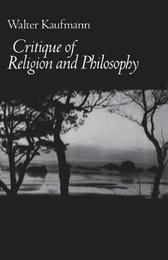
|
Critique of Religion and Philosophy
Paperback / softback
Main Details
| Title |
Critique of Religion and Philosophy
|
| Authors and Contributors |
By (author) Walter A. Kaufmann
|
| Physical Properties |
| Format:Paperback / softback | | Pages:480 | | Dimensions(mm): Height 216,Width 140 |
|
| Category/Genre | Philosophy
Philosophy of religion
Christianity |
|---|
| ISBN/Barcode |
9780691020013
|
| Classifications | Dewey:100 |
|---|
| Audience | | General | | Tertiary Education (US: College) | | Professional & Vocational | |
|---|
|
Publishing Details |
| Publisher |
Princeton University Press
|
| Imprint |
Princeton University Press
|
| Publication Date |
21 April 1979 |
| Publication Country |
United States
|
Description
From one of the major figures of twentieth-century intellectual life, an incisive critique of faith and reason in the secular age Originally published in 1958, Critique of Religion and Philosophy is Walter Kaufmann's luminous appraisal of the orthodoxies of his day. Although he was a philosopher first and foremost, Kaufmann was not immune to the wellsprings from which religion originates, considering it to be among the most vital and radical expressions of the human intellect. In this panoramic and uniquely personal book, he tests the limits of faith and reason in our secular age. Kaufmann discusses topics ranging from positivism and existentialism to language, scripture, and Eros, and shares his views on thinkers such as Plato, Aquinas, Kant, Bultmann, Niebuhr, and Freud. Challenging, playful, and disarmingly honest, Critique of Religion and Philosophy is as bold and provocative as when it was first published.
Author Biography
Walter Kaufmann (1921-1980) was the Stuart Professor of Philosophy at Princeton University, where he taught for more than thirty years. His many books include Nietzsche: Philosopher, Psychologist, Antichrist and The Faith of a Heretic (both Princeton).
Reviews"It would be hard to find a better example of modern atheistic philosophy's love affair with religion, or a more poignant one of the effort of a modern intellectual to keep the faith while eschewing belief."--Religious Studies Review
|